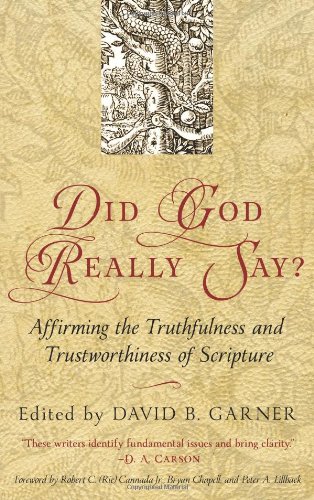A Brief Book Summary from Books at a Glance
About the Editor
David B. Garner (Ph.D., Westminster Theological Seminary) is Associate Professor of Systematic Theology at Westminster Theological Seminary, Philadelphia.
Overview
In this volume, faculty members from three Reformed seminaries come together to expound and defend the orthodox doctrine of Scripture.
Table of Contents
Forward
Robert C. Cannada Jr., Bryan Chapell, Peter A. Lillback
Introduction
David B. Garner
1. Because It Is the Word of God
K. Scott Oliphint
2. The Church, a Pillar of Truth: B. B. Warfield’s Church Doctrine of Inspiration
Michael D. Williams
3. Deconstructing Canon: Recent Challenges to the Origins and Authority of the New Testament Writings
Michael J. Kruger)
4. Inerrancy’s Complexities: Grounds for Grace in the Debate
Robert W. Yarbrough
5. God and Language
Vern S. Poythress
6. N. T. Wright and the Authority of Scripture
John M. Frame
7. Did God Really Say?
David B. Garner
Summary
Introduction
The book comes as a joint effort by Covenant Seminary, Reformed Theological Seminary, and Westminster Theological Seminary in Philadelphia to present on the nature of Scripture to the PCA’s thirty-ninth General Assembly (2011). Following a short Forward by the three presidents of those leading Reformed seminaries, David Garner continues setting out the unique features of the current climate.
Specifically, the dangers facing the church today center around a lack of discernment on the part of church leaders who want to bend on the issue of the Bible. In the name of advance, many want to question, in essence, whether Scripture is the final arbiter and interpreter of truth. Even more pointedly, error in all kinds of areas in the church often arises not from actively seeking such, but from those who try to land on a middle way – often with good motives of peace and pastoral sensitivity. Quoting Puritan Robert Traill, “such men as are for ‘middle ways’ in point of doctrine, have usually a greater kindness for that extreme they go half-way to, than for that which they go half-way from.” This volume seeks to defend and positively set forth the orthodox doctrine of Scripture in light of an evangelical trend of “showing kindness for what was once called liberalism.”
Chapter 1
Because It Is the Word of God
K. Scott Oliphint
Professor Oliphint of Westminster Seminary begins the main body of the text with a brief history and analysis of Westminster Confession of Faith chapter 1 (Of Holy Scripture) as it relates to the doctrine of God. The title has it in short: insofar as we have a good doctrine of God, one which confesses the Lord as truth itself, then Scripture as his word will also be confessed as the true witness about all of which it speaks.
To apprehend that conclusion more clearly, it is helpful to see why the seventeenth-century Divines began their monumental confession with a discussion of the word of God. The foundations (or principia) of being and thinking and, therefore, of this point of theology, come into play here. Principia are necessarily true things which we know in themselves or immediately which then ground the being or knowledge of a thing. Aristotle started us out thinking about first principles in this way. For Christians, these first principles must resolve in the simple confession of God and his word. God grounds all that is (principium essendi) and God’s word grounds our knowledge of all that is (principium cognoscendi). Perhaps it’s obvious, but God and his word form the foundation, source, or principle of all things. In fact, God’s knowledge of all things is the perfect (archetypal) knowledge of all things; our knowledge (ectypal) is only an analogy of what he knows, and yet it is true insofar as it depends on his knowledge set forth in revelation.
This basis allows us to see the spiritual, certain, and humble knowledge that a Christian can have in light of the norming norm, the Scriptures. We are fallible, true. But the revelation of a good and truthful God in Scripture gives us good reason to know that, for instance, God reconciles sinners to himself through Jesus. That is not provisional knowledge.
The objective attribute of the self-attestation of Scripture is just the point here. It’s not that the Bible is self-evidently the word of God and so can’t be denied, it it that Scripture needs no outside authority to validate it. Because it is the word of God, the word of Truth himself, it is confirmed and affirmed by us in a valid way.
Taking the view specifically of John Franke and Peter Enns, we see how it’s possible in the contemporary context to get off the tracks of this way of thinking about God and his truthfulness in his word. When that word is made to rely on the work of human hands in our theology, that is, when the Bible becomes a diverse collection of thoughts rather than the singular word of a Divine Author primarily, all kinds of hermeneutical and practical confusions follow suit.
Chapter 2
The Church, a Pillar of Truth: B. B. Warfield’s Church Doctrine of Inspiration
Michael D. Williams
Cutting through so much easy misunderstanding of B. B. Warfield’s classic doctrine of inerrancy, Michael Williams, Systematic Theology professor at Covenant Seminary, holds out a vital two-part construction of the doctrine as a corrective. It is not that Warfield would deny even the simple affirmations which many evangelical churches and organizations hold regarding Scripture; it’s that they often fall far short of his own robust teaching. Furthermore, critics of inerrancy mischaracterize his formulations as either cold and spiritless or even rationalistic. Surely this comes about through under-exposure to the Princeton theologian.
[To continue reading this summary, please see below....]The remainder of this article is premium content. Become a member to continue reading.
Already have an account? Sign In
